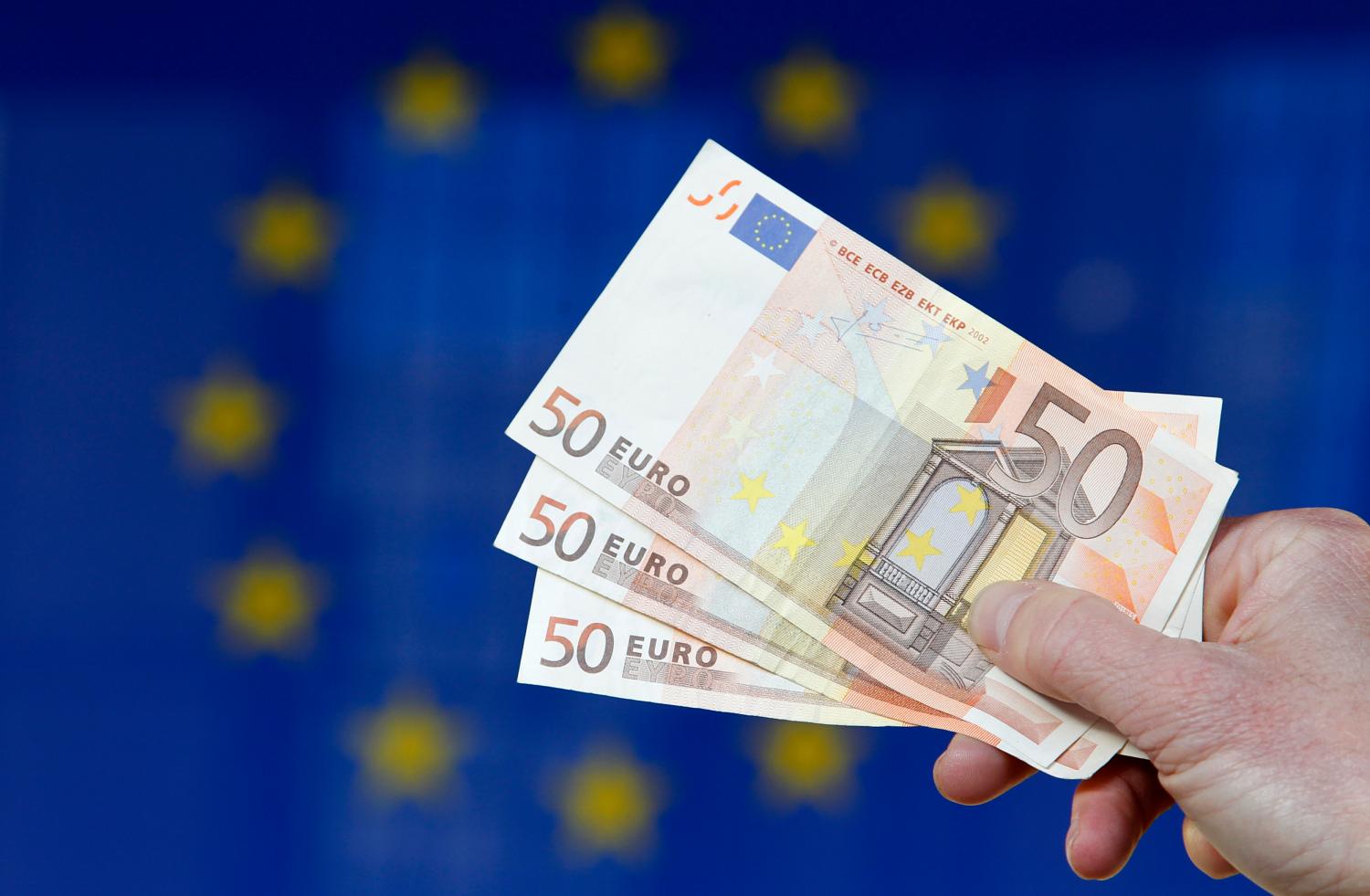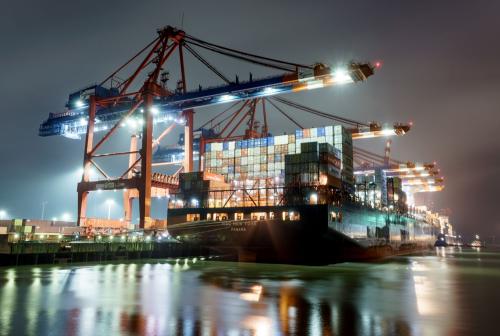The euro crisis has been ongoing for three years and the European Union is beginning to get its act together to build a sustainable monetary union. But risk of failure still remains and in turn could be devastating to the U.S. economy. Justin Vaïsse and Thomas Wright wrote this memorandum to President Obama as part of Big Bets and Black Swans: A Presidential Briefing Book.
- How can the United States shape EU fiscal policies without being a member?
- Why should the United States encourage the U.K. to remain a member of the EU?
Download Memorandum
(pdf) |
Download the Presidential Briefing Book
(pdf)
TO: President Obama
FROM: Justin Vaïsse and Thomas Wright
The Eurocrisis has been ongoing for three years and the European Union is beginning to get its act together to build a sustainable monetary union. But, the euro is not out of the woods yet. Real dangers remain. The underlying causes of the crisis have not been addressed. The politics are pulling in a different direction from that required for a solution. Populations on the periphery are suffering from austerity measures and see no end in sight. Those in the so-called core (Germany, Northern Europe) feel exploited. The Eurozone is building new structures but they may not be sufficient to protect it against a future major crisis.
As long as an optimal solution remains elusive, the risks of failure will remain. If failure occurs, it could be devastating to the U.S. economy, surpassing the crisis of 2008. Some estimates project that the collapse of the euro would cause an immediate 10 percent loss of GDP for the global economy, with unemployment in the European Union reaching 20 percent and spiraling inflation on the EU’s periphery. The United States and European Union are the two largest economies in the world and they are inextricably linked with each other through trade, foreign direct investment (FDI), and financial markets. For instance, 50 percent of U.S. FDI abroad goes to the European Union while 62 percent of FDI into the United States originates in the European Union. The rest of the world would also be adversely affected, particularly the Middle East and China, the world’s second largest national economy, both of which require robust growth to maintain domestic political stability.
A secondary but related danger is that the construction of a new Eurozone could lead to the fracturing of the European Union through a British withdrawal. The United Kingdom is extremely concerned that further integration in the Eurozone will damage its interests as an E.U. member. Public opinion also favors a renegotiation of the United Kingdom’s terms of membership even though such a renegotiation would be strewn with difficulty and would likely fail. In this scenario, the Eurocrisis would remove America’s most reliable European ally from the EU and lead to a weakening of Europe’s capacity to act as a coherent unit in world affairs.
Recommendation:
The United States can neither compel the Eurozone to adopt particular structures nor do much to protect the Eurozone from a political backlash in austerity-stricken countries. However, the United States can perform an important service in two respects. You should task your administration with analyzing the risks associated with the EU’s plans for financial and fiscal integration and share these assessments in confidence with the EU’s leaders. If necessary, senior administration officials could go public to shape opinion in the financial markets and in European states. In the 1990s, Europeans built a flawed monetary union. Eurozone 2.0 may have new structural weaknesses that will be exposed by the next crisis, whenever that occurs. These weaknesses will undoubtedly be the result of political constraints in the member states. The United States has an important role in raising awareness of these risks so Eurozone 2.0 is as effective and robust as possible.
Second, you should take a position opposing the withdrawal of the United Kingdom from the European Union. The United States can work with the United Kingdom and other members of the European Union to head off this possibility. Most importantly, the United States should emphasize the importance it places on having the United Kingdom inside the European Union, acting as a transatlantic bridge and strengthening Europe’s voice in world affairs. You should avoid any statements or policies that lead Britons to believe that an exit would result in a closer relationship with the United States that would offset any loss in influence. You should also consult closely with your European counterparts to ensure that the appropriate steps are taken to encourage the United Kingdom to remain a full member of the European Union.
If the black swan of a collapse of the Eurozone does occur, the risk of contagion in the global economy will be extremely high and it will be necessary to return to full crisis mode, as experienced in the fall of 2008, to do what is necessary to protect the financial system. This will be even more difficult than after the fall of Lehman Brothers because the collapse of the euro would create a shock of much greater scale and because the U.S. Congress may be reluctant to help foreign governments, even though it would be necessary to protect the U.S. financial system. Nevertheless, it will be your only viable option.
Background:
To understand the risks of a Eurozone collapse in the next four years, it is necessary to distinguish between the first phase of the crisis that concluded in 2012 and the second phase that has just begun. In the first phase, European governments had to decide whether to keep the euro intact or not. The key question amid market turbulence was whether the Eurozone would construct the mechanisms necessary to keep the periphery four (P4) — Greece, Ireland, Portugal, and Spain — inside the single currency. These mechanisms were expensive and politically difficult. But, this is exactly what the Eurozone decided to do. With bailout mechanisms like the European Stability Mechanism and the Stability Treaty and bold action by the European Central Bank under the leadership of Mario Draghi, the Eurozone mitigated the most destabilizing elements of the crisis. This happened for a simple reason—every leader calculated that the risks of a fragmentation of the Eurozone massively outweighed any benefits.
The second phase of the crisis is different. The question of whether EU leaders want the Euro to remain intact has been settled. But, they now face two crucial challenges. First is the danger that political and economic accidents related to the current crisis will threaten the survival of the Euro. It will take some time to build a new Eurozone. During this period, much of the European Union will be in recession or experience stagnation. Member states will disagree strongly about the future course of action. Elections are likely to be fought on these issues and they could bring to power radical parties with rejectionist policies. The result may be a political crisis that leads to an inadvertent fracturing of the Eurozone followed by contagion and a disorderly collapse.
The issue of UK membership is a related component of this first challenge. Although it is not in the Eurozone, the United Kingdom feels threatened by further European integration. Both of the U.K.’s leading parties, the Conservatives and Labour, appear on track to offer the British people an inor- out referendum, following an attempt to renegotiate the UK’s terms of membership.
The second challenge is that the Eurozone’s new structures may be insufficient to cope with a future crisis. European integration is the art of what is politically possible. But economies are not rewarded for trying hard. Their institutions need to function effectively under conditions of extreme duress. Monetary union without fiscal union was justified as the best that could be done given the political constraints and we know where that led. New structures bring new risk of design flaws, particularly in banking union, but also with respect to the perceived legitimacy of European institutions. A lack of democracy and accountability could lead to a political crisis down the road, especially if parts of the Eurozone are stagnant.
Conclusion:
A healthy global economy is a core interest of the United States. A stable and prosperous European economy is integral to that interest. For three years now, you have lived with the possibility that the collapse of the Eurozone could wreak havoc with the U.S. economy. You have also had to live with the fact that the United States has few options and no silver bullets. Quiet diplomacy and support has been your hallmark and it has been reasonably effective. You should not radically depart from this path but you should ensure it evolves to cope with the second phase of the crisis as outlined above. You should direct your administration to identify the potential vulnerabilities of reform proposals and to work with European governments, and others if necessary (public diplomacy aimed at the markets, multilateral efforts through the G-20), to prevent new failures of design. You should also use American influence to ensure that the United Kingdom remains within the European Union. These actions will reduce the probability of a black swan in Europe.





